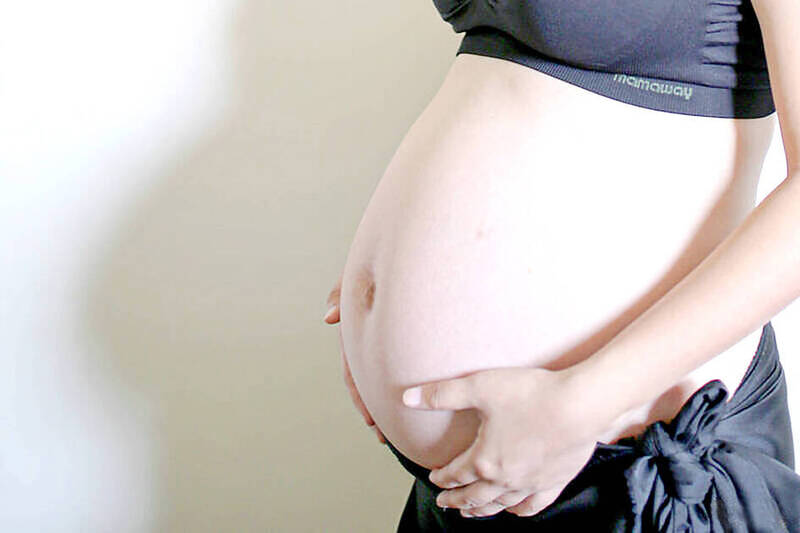About one-third of babies in Taiwan were born through caesarean section (C-section), as the nation’s C-section rate increased from 35.2 percent in 2017 to a record high of 38.4 percent in 2023, with about 52,000 babies born through the procedure that year, Health Promotion Administration data showed.
The WHO recommends a C-section rate of between 10 percent and 15 percent.
Physicians said the increase in C-sections in Taiwan could be attributed to changes in pregnant women’s traits, conservative precautionary actions by physicians to ensure the safety of the mother and child, or because the parents want to select an auspicious time for childbirth.

Photo: Taipei Times
Taiwan Society of Perinatology consultant Hung Tai-ho (洪泰和) yesterday said the increase in C-sections is likely associated with advanced maternal age or obesity, as they could face increased risk of complications.
It might also be because the pregnancies were achieved through assisted reproductive technology, prompting physicians to take precautionary measures to ensure the safety of the mother and child, he said.
The average maternal age is 10 years older than one or two decades ago, so many women are giving birth at a more advanced maternal age, which is a high-risk category due to increased risks of complications including hypertension and diabetes, the society said.
As women who give birth at an advanced maternal age often only bear one or two children, compared with those who gave birth to four or five children through natural delivery in the past, the low birthrate also reduced the natural delivery rate, and in turn the C-section rate increased, it said.
Moreover, with advanced assisted reproductive technology, women who are giving birth at an advanced maternal age might have gone through many difficulties to achieve the pregnancy, and might be more concerned about the health of their baby and are more willing to go through a C-section, it said.
In vitro fertilization can also increase the chance of multiple births, which can lead to an increase in the C-section rate, it said.
Meanwhile, some parents want to select an auspicious time for childbirth, but physicians would usually ask them to pick a time after 38 weeks of pregnancy, a workday and have other options prepared, it added.
Hung said there are more advantages to natural birth, including squeezing out amniotic fluid in the baby’s lungs when they pass through the vagina — reducing the risks of respiratory problems in the baby — and a faster recovery for the mother, as well as a reduced risk of infection and lower blood loss.
Taiwan Association of Obstetrics and Gynecology secretary-general Huang Chien-pei (黃建霈) said medical teams usually perform a C-section only when they have assessed the risks and benefits, and that several high-risk pregnancy cases have been saved by a C-section.
Additional reporting by Hsu Li-chuan

Right-wing political scientist Laura Fernandez on Sunday won Costa Rica’s presidential election by a landslide, after promising to crack down on rising violence linked to the cocaine trade. Fernandez’s nearest rival, economist Alvaro Ramos, conceded defeat as results showed the ruling party far exceeding the threshold of 40 percent needed to avoid a runoff. With 94 percent of polling stations counted, the political heir of outgoing Costa Rican President Rodrigo Chaves had captured 48.3 percent of the vote compared with Ramos’ 33.4 percent, the Supreme Electoral Tribunal said. As soon as the first results were announced, members of Fernandez’s Sovereign People’s Party

MORE RESPONSIBILITY: Draftees would be expected to fight alongside professional soldiers, likely requiring the transformation of some training brigades into combat units The armed forces are to start incorporating new conscripts into combined arms brigades this year to enhance combat readiness, the Executive Yuan’s latest policy report said. The new policy would affect Taiwanese men entering the military for their compulsory service, which was extended to one year under reforms by then-president Tsai Ing-wen (蔡英文) in 2022. The conscripts would be trained to operate machine guns, uncrewed aerial vehicles, anti-tank guided missile launchers and Stinger air defense systems, the report said, adding that the basic training would be lengthened to eight weeks. After basic training, conscripts would be sorted into infantry battalions that would take

GROWING AMBITIONS: The scale and tempo of the operations show that the Strait has become the core theater for China to expand its security interests, the report said Chinese military aircraft incursions around Taiwan have surged nearly 15-fold over the past five years, according to a report released yesterday by the Democratic Progressive Party’s (DPP) Department of China Affairs. Sorties in the Taiwan Strait were previously irregular, totaling 380 in 2020, but have since evolved into routine operations, the report showed. “This demonstrates that the Taiwan Strait has become both the starting point and testing ground for Beijing’s expansionist ambitions,” it said. Driven by military expansionism, China is systematically pursuing actions aimed at altering the regional “status quo,” the department said, adding that Taiwan represents the most critical link in China’s

EMERGING FIELDS: The Chinese president said that the two countries would explore cooperation in green technology, the digital economy and artificial intelligence Chinese President Xi Jinping (習近平) yesterday called for an “equal and orderly multipolar world” in the face of “unilateral bullying,” in an apparent jab at the US. Xi was speaking during talks in Beijing with Uruguayan President Yamandu Orsi, the first South American leader to visit China since US special forces captured then-Venezuelan president Nicolas Maduro last month — an operation that Beijing condemned as a violation of sovereignty. Orsi follows a slew of leaders to have visited China seeking to boost ties with the world’s second-largest economy to hedge against US President Donald Trump’s increasingly unpredictable administration. “The international situation is fraught